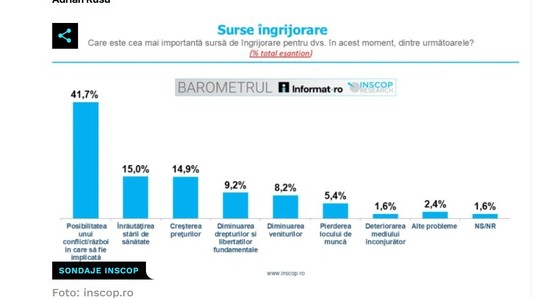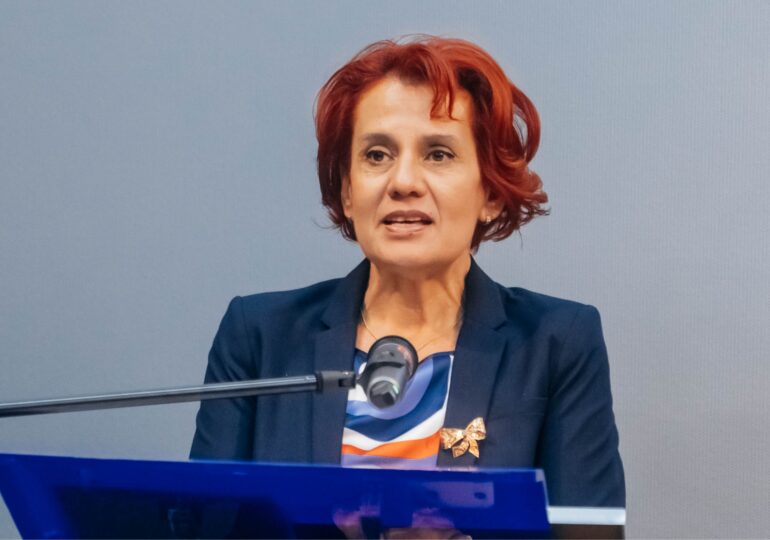In front of a hypermarket in a medium-sized city, a group of taxi drivers are intensely debating. Not about the government, not about taxes and prices, but about war. Whether Putin will or will not drop the nuclear bomb, and when.
This urban Poiana of Iocan, a parking lot, confirms at a micro level the conclusion of a recent barometer conducted by INSCOP, according to which Romanians’ main concern, far ahead of their own health, prices, etc., is the war.

Even though Romania has never been in a better security situation in its history, under the umbrella of the most important military alliance. So why this intense phobia?
On one hand, it's about the intense propaganda of the nationalist isolationist zone, which has turned these fears into an essential campaign theme. Pro-Europeans want to drag us into a war that is not ours, for the interests of Brussels.
Mothers, your sons will leave, wives, your husbands will leave, to die for others! This was a crucial line of attack.
There were hysterical campaigns on social media platforms where false conscription orders were presented. Romanians from the diaspora filmed themselves announcing that they would not return to the country this summer to avoid being drafted into war, somehow presented as the result of manipulation by Ukraine to extend its own crisis.
And this is a cause that primarily affects the AUR electorate.
But it's not the only one. There is constant talk about the need to increase defense spending, not only in Romania. And the NATO Secretary General made an extremely strong and serious statement this week:
"Russia could be ready to use military force against NATO within five years. Five years. Let's not have any illusions. Now we are all on the eastern flank.
The new generation of Russian missiles moves many times faster than the speed of sound. The distance between European capitals is just a matter of minutes. There is no longer east or west. There is only NATO."
We are witnessing a major escalation of the conflict in the Middle East. The atmosphere on the planet is far from calm.
In these conditions, concern about war is not a fantasy. The question is how it should be managed, because here a paradox arises: a large part of the most worried Romanians demand measures that increase the risk of war.
The perception that we are in danger is correct. Russia had its moment of setback, but its imperialistic nostalgia is being fully exploited by a leader on the brink of madness, if not beyond, himself sick with power and with evident fantasies of grandeur.
It is also evident that Russia is investing in the military industry far beyond what its defense needs would imply.
What extremists propose, whether voluntarily or populistically, is a policy of complete exposure to the risk of war. Let's not invest in defense anymore, because, you know, we want peace and we need money for hospitals, pensions, and children. Let's leave Ukraine to deal with Russia as it knows how because it's not our problem, and who knows what they did to provoke the Russians. We are too small and too poor to not bow our heads.
It is essential for people to be credibly explained, in their own language, the language of Iocan's Poiana, that arming is the best path to deterring war, from the Romans onwards. If you want peace, you must prepare for war. They should also be explained that any expense for the war in Ukraine is, especially for Romania, an investment in its own security.
Ukraine is what separates us from Russia. If it falls, we will have a direct border with Russia. If Russia emerges victorious, at least partially, in Ukraine, it will consider that it can move further, and after a while, Romania will become a definite target.
The major problem is not formulating these simple issues. They are not hard to understand. The major problem is how these messages can reach the huge percentage of those who believe that the danger is Ukraine, not Russia.
We have authorities and a mainstream media with major credibility issues from the pandemic period, and social media platforms are the perfect environment for the propagation of any conspiracy, much more credible from the start than the official version.
As long as trust in institutions and official information is not regained, even simple truths will be very difficult to impose in the face of lies, no matter how blatant. With restrictions, fines, persecution, it will not work. It only works with trust.

